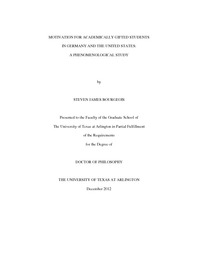
ATTENTION: The works hosted here are being migrated to a new repository that will consolidate resources, improve discoverability, and better show UTA's research impact on the global community. We will update authors as the migration progresses. Please see MavMatrix for more information.
Show simple item record
| dc.contributor.author | Bourgeois, Steven James | en_US |
| dc.date.accessioned | 2013-03-20T19:10:35Z | |
| dc.date.available | 2013-03-20T19:10:35Z | |
| dc.date.issued | 2013-03-20 | |
| dc.date.submitted | January 2012 | en_US |
| dc.identifier.other | DISS-11890 | en_US |
| dc.identifier.uri | http://hdl.handle.net/10106/11507 | |
| dc.description.abstract | Recent trends toward globalization have engendered interest in comparative educational systems, pointing toward more fundamental change beyond the current focus upon accountability measures. This phenomenological study considered the effect of extrinsic motivators on the intrinsic motivation of academically gifted students in Germany and the United States. Nine top performing 16 and 17-year olds attending private schools in Germany and the United States participated in open-ended interviews to determine their motivational orientation toward academic tasks. Teachers and administrators from both schools provided comments to support the contextual understanding gained from classroom observations. Although numerable quantitative studies have measured levels of intrinsic and extrinsic motivation for diverse groups, there are few phenomenological studies that attempt to explore the subtlety of cognitive processes. Conspicuously lacking also are cross-cultural studies relating to intrinsic and extrinsic motivation. In the present study I posed research questions relating to how academically gifted students in both countries experience motivation toward academic tasks. Through the frames of self-determination theory (Deci & Ryan, 1985) and flow theory (Csikszentmihalyi, 1975, 1990, 1997), I considered how extrinsic motivators such as grades, high-stakes tests, and parental expectations affect intrinsic motivation. Results indicated that the American students experienced relatively more autonomy-supportive instruction, a greater sense of belonging in the school environment, and more frequent flow experiences in the academic context than their German counterparts. Conversely, the German students exhibited less focus upon competition and greater intrinsic interest in their academic activities than the American students. With this in mind, the study provided insight into both educational systems, particularly with respect to student motivation. It addressed the unintended consequences of standards-based instruction, uniform teaching methods, and high-stakes testing that have become the norm in both countries. Perhaps most importantly, it identified gifted academic motivation as a potential problem, rather than as an outward sign of a school's success. | en_US |
| dc.description.sponsorship | Hyle, Adrienne E. | en_US |
| dc.language.iso | en | en_US |
| dc.publisher | Education | en_US |
| dc.title | Motivation For Academically Gifted Students In Germany And The United States: A Phenomenological Study | en_US |
| dc.type | Ph.D. | en_US |
| dc.contributor.committeeChair | Hyle, Adrienne E. | en_US |
| dc.degree.department | Education | en_US |
| dc.degree.discipline | Education | en_US |
| dc.degree.grantor | University of Texas at Arlington | en_US |
| dc.degree.level | doctoral | en_US |
| dc.degree.name | Ph.D. | en_US |
Files in this item
- Name:
- Bourgeois_uta_2502D_11890.pdf
- Size:
- 1.219Mb
- Format:
- PDF
This item appears in the following Collection(s)
Show simple item record


